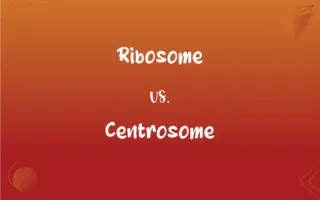Glycogenolysis vs. Gluconeogenesis: What's the Difference?
Edited by Aimie Carlson || By Janet White || Published on January 9, 2024
Glycogenolysis is the breakdown of glycogen into glucose, while gluconeogenesis is the synthesis of glucose from non-carbohydrate sources.

Key Differences
Glycogenolysis is a metabolic pathway that breaks down glycogen into glucose, primarily in the liver and muscles, providing an immediate energy source. Gluconeogenesis, in contrast, is the process of glucose synthesis from non-carbohydrate precursors, like lactate and amino acids, mainly occurring in the liver.
The purpose of glycogenolysis is to maintain blood glucose levels during short-term fasting or physical activity. Gluconeogenesis, however, serves as a critical mechanism during prolonged fasting or starvation, synthesizing glucose to sustain energy levels when dietary carbohydrates are scarce.
Glycogenolysis is a relatively quick response to the body's immediate energy needs, rapidly mobilizing stored glycogen. Gluconeogenesis, on the other hand, is a more prolonged and complex process, involving multiple enzymatic steps to create glucose from scratch.
Hormones like adrenaline and glucagon trigger glycogenolysis, responding to immediate energy demands. Gluconeogenesis is primarily regulated by the hormone insulin, which helps balance blood glucose levels over longer periods.
Both glycogenolysis and gluconeogenesis are crucial for glucose homeostasis, but they operate under different physiological conditions and fulfill distinct metabolic roles in the body's energy management.
ADVERTISEMENT
Comparison Chart
Definition
Breakdown of glycogen into glucose
Synthesis of glucose from non-carbohydrate sources
Primary Function
Immediate energy supply
Long-term energy supply during fasting
Speed
Rapid response
Slower, complex process
Hormonal Regulation
Triggered by adrenaline and glucagon
Regulated by insulin
Physiological Condition
During short-term fasting or physical activity
During prolonged fasting or starvation
ADVERTISEMENT
Glycogenolysis and Gluconeogenesis Definitions
Glycogenolysis
Glycogenolysis is the process of converting glycogen to glucose.
During the workout, her body's glycogenolysis increased to meet energy demands.
Gluconeogenesis
It synthesizes glucose when dietary carbs are unavailable.
Gluconeogenesis helps maintain energy levels during starvation.
Glycogenolysis
Glycogenolysis rapidly provides glucose for energy.
Intense exercise triggers glycogenolysis to supply immediate energy.
Gluconeogenesis
Gluconeogenesis is a vital metabolic pathway during fasting.
The liver's gluconeogenesis activity increases after several hours without food.
Glycogenolysis
It's the breakdown of glycogen in liver and muscle cells.
Glycogenolysis in his liver helped stabilize his blood sugar levels.
Gluconeogenesis
Gluconeogenesis is the creation of glucose from non-carbohydrate sources.
His body relied on gluconeogenesis during the prolonged fast.
Glycogenolysis
It's a critical response to the body's need for glucose.
Glycogenolysis kicked in during her fasting period.
Gluconeogenesis
It involves multiple steps to produce glucose from amino acids and lactate.
Gluconeogenesis was essential for her recovery post-workout.
Glycogenolysis
Glycogenolysis is essential for maintaining blood glucose levels.
Glycogenolysis played a key role in her energy management during the marathon.
Gluconeogenesis
Gluconeogenesis ensures a continuous glucose supply.
During his low-carb diet, gluconeogenesis played a crucial role in balancing blood sugar.
Glycogenolysis
The biochemical breakdown of glycogen to glucose.
Gluconeogenesis
The formation of glucose, especially by the liver, from noncarbohydrate sources, such as amino acids and the glycerol portion of fats.
Glycogenolysis
(biochemistry) The production of glucose-1-phosphate by splitting a glucose monomer from glycogen using inorganic phosphate
Gluconeogenesis
(biochemistry) The metabolic process in which glucose is formed, mostly in the liver, from non-carbohydrate precursors
FAQs
What is gluconeogenesis?
It's the synthesis of glucose from non-carbohydrate sources like lactate and amino acids.
Is glycogenolysis a quick process?
Yes, it's a rapid response to immediate energy demands.
Can glycogenolysis happen during sleep?
Yes, to maintain blood glucose levels.
What triggers gluconeogenesis?
It's triggered during prolonged fasting or low carbohydrate intake.
Why is glycogenolysis important during exercise?
It provides rapid energy by releasing glucose.
What exactly is glycogenolysis?
It's the breakdown of glycogen into glucose, primarily in the liver and muscles.
Where does glycogenolysis primarily occur?
Mainly in the liver and muscles.
How complex is gluconeogenesis compared to glycogenolysis?
Gluconeogenesis is more complex, involving multiple enzymatic steps.
Does gluconeogenesis only occur in the liver?
It primarily occurs in the liver, but also to a lesser extent in the kidneys.
What are the key hormones in glycogenolysis?
Adrenaline and glucagon.
Is insulin involved in gluconeogenesis regulation?
Yes, insulin plays a significant role in its regulation.
How does gluconeogenesis affect blood sugar levels?
It helps stabilize blood sugar levels during prolonged periods without food.
Can glycogenolysis occur without gluconeogenesis?
Yes, they are independent processes but both contribute to glucose balance.
What factors increase glycogenolysis?
Physical activity and stress.
Can gluconeogenesis meet all the body's glucose needs?
In times of extended fasting or carb restriction, it can significantly contribute but may not cover all energy needs.
What is the end product of glycogenolysis?
Glucose.
Is glycogenolysis a form of energy storage?
No, it's the mobilization of stored energy.
How does a high-protein diet affect gluconeogenesis?
It can increase gluconeogenesis due to more amino acid availability.
What happens to glycogenolysis during fasting?
It increases to maintain blood glucose levels.
Are amino acids involved in gluconeogenesis?
Yes, they are among the precursors.
About Author
Written by
Janet WhiteJanet White has been an esteemed writer and blogger for Difference Wiki. Holding a Master's degree in Science and Medical Journalism from the prestigious Boston University, she has consistently demonstrated her expertise and passion for her field. When she's not immersed in her work, Janet relishes her time exercising, delving into a good book, and cherishing moments with friends and family.
Edited by
Aimie CarlsonAimie Carlson, holding a master's degree in English literature, is a fervent English language enthusiast. She lends her writing talents to Difference Wiki, a prominent website that specializes in comparisons, offering readers insightful analyses that both captivate and inform.






































































